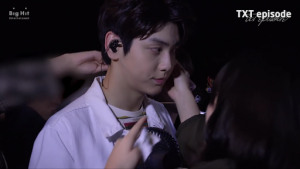
Behind the scenes footage of music shows, music video filming, and photo shoots are available on most idol YouTube channels. They offer curious fans a glimpse at the busied lives of idols and idol management teams. The popularity of this content has prompted several new shows including JYP Entertainment’s reality TV show Super Intern and MBC’s variety show The Manager.
The company and management team are vague figures; they almost never come in direct contact with the public. Yet, they are still under the intense scrutiny of the public eye as anonymous figures. Through the humorous lense of The Manager, viewers can gain a better understanding of who they are and what they do, as well as the difficulties they face.
On April 21st, 2019, Manager Son of idol group MustB passed away at 3:40 am in the morning after speeding down Olympic Highway to the group’s dorms after a schedule. Unfortunately, news of car accidents is commonplace in K-pop. These car crashes more often result in minor injuries, scrapes and bruises. However, there are cases such as this recent one in which an idol or staff member is injured more severely or even fatally. Managers are infamous for reckless and hazardous driving, but often, the problem lies in the stressful, unhealthy conditions they work under. Especially in the case of rookie groups like MustB, managers do not have a choice but to make any and all efforts to arrive timely to an event, despite traffic, weather, or other obstacles.
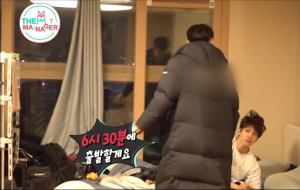
During promotional periods, managers are with idols at all times of the day. In fact, their working hours extend beyond the working hours for the idols they manage. In episode 42 of The Manager, Seventeen starts their day at 6 am, with the managers waking up all of the members individually. Even before Seventeen is awake, manager Jeong Young-hwan has bought all of the members’ breakfast to go. Member Seungkwan explains that for the past week of their then-ongoing promotions with “Home”, their managers had gone to sleep at around 1 or 2 am after a music show and woken up at around 5 am to prepare the schedule for the next day.
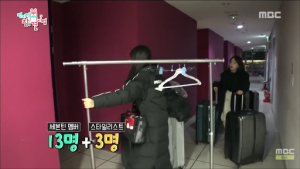
As the Seventeen members arrive in the dressing room for a music show, they throw themselves on the sofa and seating areas and get some shut-eye at the beginning of a long day. Their staff, in contrast, hardly get to rest. The typically blurred figures of the staff are not censored here, and we watch them file into the waiting room with dozens of suitcases. Manager Jeong is responsible for checking attendance, obtaining and providing supplies, and monitoring their performances. In this episode, the viewers follow Manager Jeong, who is the recent addition to the team and is in charge of the more tedious jobs. There are other managers who have tasks that carry more weight such as acquiring spots for variety shows and promotional events. It becomes evident that the manager team of only three people have an incredible number of responsibilities.
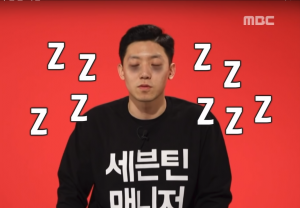
Manager Jeong’s appearance in the interviews serves testimony to his work ethic. At one point, he indeed closes his eyes and dozes off mid-sentence. The editing caricatures him, accentuating his dark eye bags and fatigued mannerisms. Later in the episode, he is compared to a drill instructor. The characteristic playful editing style of Korean variety shows reinforces his hardworking image on the show.
In addition to working long hours, managers also go to great lengths to provide for the idol group in the nuances of work and daily life. In Seventeen’s waiting room, it is revealed that a special box was created just for their microphones, due to their large number of members, and this has to be transported and managed by their managers. In episode 26, Winner’s manager Yu Si-mon goes grocery shopping and leaves for another store after being unable to find a requested item at one store. Small gestures also indicate the detailed, personalized care given to idols. For example, Winner’s Mino is shocked when Manager Yu has prepared with an entire box of lip balm because of his recurrent requests.
The number of members in an idol group is a factor increasing the scope of management. For example, when Seventeen’s Mingyu falls asleep behind a rack of clothing, Manager Jeong scours through the crowded room to look for him. When all of the members have to be in one place at a certain time, it is difficult to keep track of them.
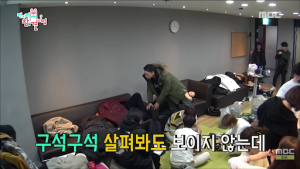
This is a challenge to decision making. Idol managers have to choose between authoritarian efficiency and the artist’s individuality and freedom. In order to maintain employee satisfaction, managers should respect personal rights and allow job discretion. On the other hand, managers have difficulty considering or organizing these personal interests because their main priority is completing the work schedule. And so, artists are constrained to certain extents. The Seventeen members use the bathroom together in small groups so they can be easily located when they are needed. Using the bathroom is an action that is extremely private and essential to our daily life. The freedom to go whenever needed could be considered a basic human right, but it is something that idols cannot be granted fully by their management.
Still, it is evident that efforts are made to find a reasonable balance. For example, Manager Jeong provides three lunch menu options for Seventeen to vote for. For a minute or two, the waiting room explodes in an enthusiastic debate between the members before they reach a conclusion. It would have been easier for Manager Jeong to decide on what food to buy, but Seventeen are allowed some choices in their otherwise quite restrictive schedule.
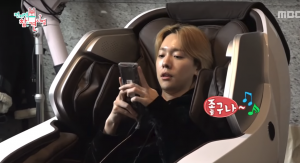
The cast of The Manager often teases the idol members for their moments of self-indulgence. In the Seventeen episode, Mingyu is the center of attention as he naps and falls behind the instructed schedule multiple times. This shortcoming escalates anxiety for Manager Jeong. Winner’s Jinwoo has a similar inclination for rest as he spends most of his free time watching TV in a massage chair. At this time, Manager Yu is grocery shopping for the group. By juxtaposing clips of working managers with resting idols, the show intends to attract sympathy for the managers. For the same purpose, many of the clips are filmed from a third-person perspective so the show effectively detaches the viewer from the idols. This style of execution may be typical, but The Manager nonetheless effectively depicts an alternate perspective by zooming out from the lenses of an idol vlog.
Because of the unclear divide between the personal and professional spheres for celebrities, many topics, from dating to artistic direction, sit in an area of discussion. There are often numerous conflicts, insignificant and significant, that arise between the company and the artists. However, as fans looking from an external perspective, it is necessary to extend our empathy to the stresses and difficulties that lay on both sides.
(Images via Big Hit Entertainment, Kocowa, MBC)


